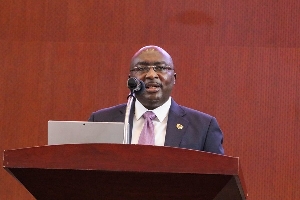- Home - News
- TWI News | TV
- Polls
- Year In Review
- News Archive
- Crime & Punishment
- Politics
- Regional
- Editorial
- Health
- Ghanaians Abroad
- Tabloid
- Africa
- Religion
- Election 2020
- Coronavirus
- News Videos | TV
- Photo Archives
- News Headlines
- Press Release
General News of Wednesday, 10 September 2003
Source: GNA
Cartagena protocol comes into force tomorrow
Accra, Sept. 10, GNA - The Cartagena Protocol on Biosafety, a legally binding protocol to the Convention on Biological Diversity (CBD) comes into force tomorrow September 11 with Ghana as the 49th member state.
The Convention needed at least 50 countries to ratify it before it could come into force and Ghana did that as the 49th state on May 30, whilst Palau, an Island in the Pacific ratified on June 13th as the 50th member state.
The Cartagena Protocol is a global instrument to assist parties in managing practices in modern biotechnology as well as cross border activities in relation to Genetically Modified (GM) products.
Mr Edward O. Nsenkyire, Chief Director of the Ministry of Environment and Science said Ghana needed to establish a good biosafety policy framework backed by legislation, before it fully adopted the modern biotechnology in line with international obligations.
He was speaking at the launch of the national consultation programme of the national Biosafety framework development process under the theme, " Biotechnology for Sustainable Development in Ghana" organized by the National Biosafety Committee in Accra.
He said Ghana, through the Ministry of Environment and Science had been a firm advocate of the precautionary principle which states that "When embarking on something, we should think very carefully about whether it is safe or not, and we should not go ahead until we are convinced it is".
Mr Nsenkyire said to pursue a proactive programme for biosafety in Ghana it joined 117 other countries to source for funds from the United Nations Environment Programme (UNEP) and the Global Environment Facility (GEF) for the development of the national biosafety framework and to help build national capacity in the management of biotechnology.
Professor Edward H. K. Akaho, Director-General of the Ghana Atomic Energy Commission said the commission had established three research institutes and five centres to promote nuclear energy and biotechnology techniques for the sustainable development in Ghana.
He said the benefits of nuclear energy were numerous and would help in areas such as food security, health, industry and the environment. "We are not makers of bomb as some Ghanaians perceive but rather committed to the peaceful application of nuclear energy," he said.










